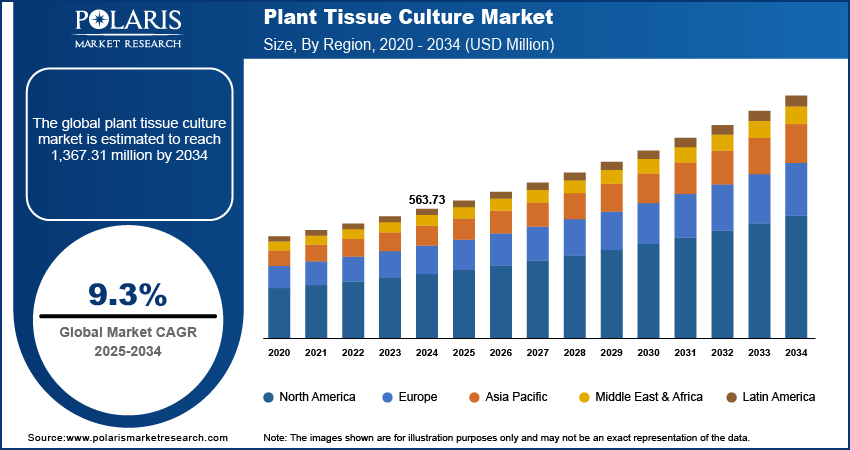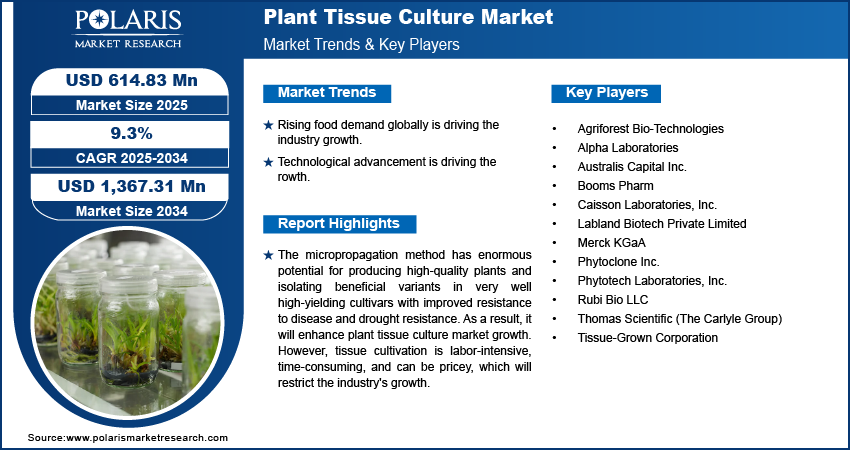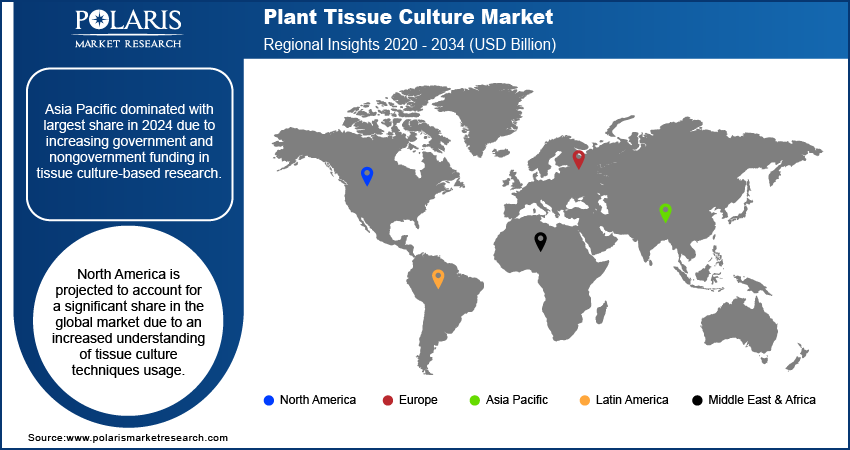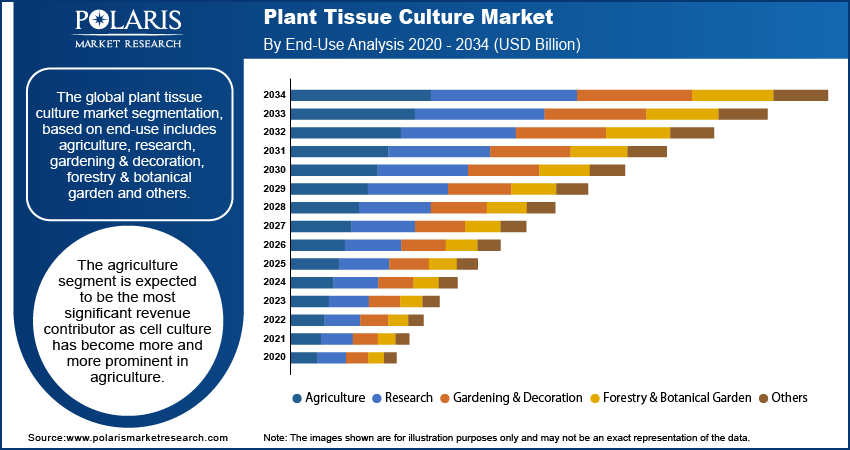
Plant Tissue Culture Market Size, Share, Trends, & Industry Analysis Report
By End-Use (Agriculture, Research), By Crop Type, By Stage, By Region – Market Forecast, 2025–2034
- Published Date:Sep-2025
- Pages: 117
- Format: PDF
- Report ID: PM2383
- Base Year: 2024
- Historical Data: 2020 - 2023
Overview
The global plant tissue culture market was valued at USD 563.73 million in 2024 and is expected to grow at a CAGR of 9.3% during the forecast period. The plant tissue culture market is expected to be driven by numerous genetic engineering techniques. This cell culture method can be a renewable supply of valuable pharmaceutical compounds, colorants, aromas, and flavors that would be difficult to manufacture using chemical synthesis or microbial cells.
Key Insights
- The agriculture segment is expected to be the most significant revenue contributor as cell culture has become more and more prominent in agriculture.
- The vegetable segment is expected to experience significant growth during the forecast period due to rising demand for the disease free and high-quality vegetables seedlings.
- Asia Pacific dominated with largest share in 2024 due to increasing government and nongovernment funding in tissue culture-based research.
- North America is projected to account for a significant share in the global market due to an increased understanding of tissue culture techniques usage.
Industry Dynamics
- The rising awareness about advantages of plant tissue culture such as increased yield, efficiency, and quality is fueling the adoption.
- Rising food demand globally is driving the industry growth.
- Technological advancement is driving the growth.
- he high cost and technical expertise required for establishing and maintaining tissue culture laboratories is restraining the adoption.
Market Statistics
- 2024 Market Size: USD 563.73 Million
- 2034 Projected Market Size: USD 1,367.31 Million
- CAGR (2025-2034): 9.3%
- Largest Market: Asia Pacific

To Understand More About this Research: Request a Free Sample Report
Furthermore, this approach could provide a consistent and stable source of herbal medications. The number of natural compounds obtained utilizing cell cultures is enormous and steadily increasing. Unlike microorganism cultivation, the cells are cultivated on a huge scale in a fermenter.
These benefits include a continual supply of plants as raw materials as well as the creation of wholly novel chemicals under controlled conditions. Furthermore, cell culture is recognized as the most advanced technology for crop improvement through the generation of somaclonal and gameto clonal variations.
The micropropagation method has enormous potential for producing high-quality plants and isolating beneficial variants in very well high-yielding cultivars with improved resistance to disease and drought resistance. As a result, it will enhance plant tissue culture market growth. However, tissue cultivation is labor-intensive, time-consuming, and can be pricey, which will restrict the industry's growth.
Industry Dynamics
Growth Drivers
Transgenic crops are in high demand due to the numerous advantages they provide, such as increased yield, efficiency, and quality and the production of insect-resistant cultivars. For instance, as per the Statista Reports, In 2019, the United States had some of the most genetically modified seeds (71.5 million hectares), followed by Germany (a little more than 52.8 acres).
Also, international standards are there for the safety assessment of transgenic plants. For instance, the Organization for Economic Co-operation and Development (OECD) general agreement documents the safety evaluation of transgenic plants, including proximate, anti-nutritional molecules, natural toxins and food allergies, and other metabolic products characteristic of the species.
Further, cell culture methods are the most commonly used biopharmaceutical tools for fundamental and applied purposes ranging from germination and seedling process investigation, commercial micropropagation, creation of transgenic floras with particular industrial and crop yield traits, and genetic improvement, virus removal from infected components to render high-quality, and biotechnology and crop improvement.

Report Segmentation
The market is primarily segmented based on stage, plant, crop type, end-use, and region.
|
By Stage |
By Plant |
By Crop Type |
By End-Use |
By Region |
|
|
|
|
|
Know more about this report: request for sample pages
Insight by End-Use
The agriculture segment is expected to be the most significant revenue contributor in the global market. This cell culture has become more and more prominent in agriculture. It is one method to commercialize a solution to the food shortage problem in developing countries, allowing them to manage their fast-increasing population in a limited amount of land, driving the plant tissue culture market growth.
Tissue culture enables propagators to conserve tissue DNA, create more vigorous crops, and ultimately save cost and enhance revenue. As a result, the cell culture is in high demand in the agricultural sector, driving plant tissue culture market expansion over the forecast period.
Insight by Crop Type
The vegetable segment is expected to experience significant growth during the forecast period due to rising demand for the disease free and high-quality vegetables seedlings. This demand is driven by need for high productive farming practices. Moreover, rising food demand globally is further fueling the growth of the segment. This rise in demand is fuel by growing population size. Healthy seedling helps in stable supply of food with improved production output. Disease-free seedlings reduce crop losses and improve the overall quality and shelf life of vegetables, which drives the segment growth
Geographic Overview
Asia Pacific had the largest revenue share in the global market. This dominance is attributable to the increasing government and nongovernment funding in tissue culture-based research, strong government backing, significant biopharmaceutical development expenditure, and greater advanced technologies in the Asia Pacific. For instance, the Government of India's Department of Biotechnology (DBT) has independently allocated $640,000 to Hyderabad-based institutes Centre for Cellular and Molecular Biology (CCMB) and National Research Centre on Meat Science and Technology (NRCMST) in April 2021. The contribution is one of the greatest ever provided by a nation in cell-based meat research. It shows that India is prepared to make bold investments in the nutrition security of the world's rising population. Also, the Department of Biotechnology (DBT), Govt. Of India has launched a Nationwide Certification System for Tissue Culture Raised Plants (NSC TCP) to produce and distribute high-quality culturing sowing materials. Thus, the government support for culture-based research and the various governmental organizations for assisting the tissue culture, among others, are boosting the regional growth.
North America is expected to witness a high CAGR in the global market in 2024. The region is expanding due to an increased understanding of tissue culture techniques usage. Furthermore, the emphasis of major manufacturers on increasing their presence worldwide in rising North American countries to grab a large market share is likely to fuel the region's tissue culture market growth. For instance, in August 2021, Vita Farms and ForemostCo partnered to develop a new culturing lab, Vita Labs, in Guatemala to meet the demand for artificial tissue culture media. The new facility was established in response to a rise in global market demand for clean and healthy starting materials. The epidemic has undoubtedly sparked a surge in market demand for attractive bonsai, resulting in well-documented demand and supply concerns. Vita Labs is a cutting-edge 8,000-square-foot facility that can generate 15 million plants per year when fully employed. Thus, the expansion of geographical presence and the establishment of new labs to generate clean and healthy plant materials are boosting regional growth.

Competitive Insight
Some of the major players operating in the global market include Alpha Laboratories, Agriforest Bio-Technologies, Booms Pharm, Caisson Laboratories, Inc., Australis Capital Inc., Labland Biotech Private Limited, Phytotech Laboratories, Inc., Phytoclone Inc., Rubi Bio LLC, Merck KGaA, Thomas Scientific (The Carlyle Group), and Tissue-Grown Corporation among others.
Plant Tissue Culture Market Report Scope
|
Report Attributes |
Details |
|
Market size value in 2024 |
USD 563.73 Million |
| Market size value in 2025 | USD 614.83 Million |
|
Revenue forecast in 2034 |
USD 1,367.31 Million |
|
CAGR |
9.3% from 2025 - 2034 |
|
Base year |
2024 |
|
Historical data |
2020 - 2023 |
|
Forecast period |
2025 - 2034 |
|
Quantitative units |
Revenue in USD Million and CAGR from 2025 to 2034 |
|
Segments covered |
By Stage, By Plant, By Crop Type, By End-Use, By Region |
|
Regional scope |
North America, Europe, Asia Pacific, Latin America, Middle East & Africa |
|
Key companies |
Alpha Laboratories, Agriforest Bio-Technologies, Booms Pharm, Caisson Laboratories, Inc., Australis Capital Inc., Labland Biotech Private Limited, Phytotech Laboratories, Inc., Phytoclone Inc., Rubi Bio LLC, Merck KGaA, Thomas Scientific (The Carlyle Group), and Tissue-Grown Corporation |
FAQ's
• The market size was valued at USD 563.73 million in 2024 and is projected to grow to USD 1,367.31 million by 2034.
• The market is projected to register a CAGR of 9.3% during the forecast period.
• A few of the key players in the market are Alpha Laboratories, Agriforest Bio-Technologies, Booms Pharm, Caisson Laboratories, Inc., Australis Capital Inc., Labland Biotech Private Limited, Phytotech Laboratories, Inc., Phytoclone Inc., Rubi Bio LLC, Merck KGaA, Thomas Scientific (The Carlyle Group), and Tissue-Grown Corporation.
• The agriculture segment is most significant revenue contributor in the global market.
• The vegetable segment dominated with largest share in 2024.

